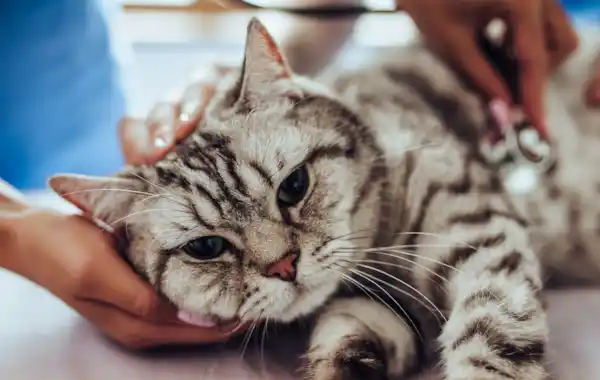Lymphoma is probably the most common of all feline cancers and affects cats of any age. It can be tricky for vets to spot as symptoms can come and go, or present like other diseases.
Out of control
The word ‘cancer’ describes the process when body cells behave abnormally and grow out of control. Lymphoma is cancer of lymphocytes (white blood cells) within the lymphatic system (the body’s disease fighting system). Lymph nodes contain large numbers of lymphocytes and are present throughout your cat’s body. They enlarge in response to infection (if you’ve ever had a sore throat, you’ve probably felt your enlarged lymph nodes either side of your neck).
Common types
Any bodily organ containing lymphocytes can develop lymphoma. In cats, common types of lymphoma include:
- Gastrointestinal/ alimentary lymphoma (in the stomach and intestines)
- Mediastinal lymphoma (in the chest)
- Multi-centric lymphoma (in many lymph nodes and different areas around the body)
- Extra nodal lymphoma (in areas other than those listed above such as the brain or kidneys) Unlike other cancers, infection with some viruses make it more likely cats will develop lymphoma (although any cat can develop it). If your cat has FeLV (feline leukaemia virus) or FIV (feline immunodeficiency virus), your vet will make sure to check them regularly for signs of lymphoma.
Tests and biopsies
Symptoms of lymphoma very much depend on where the cancer is. For example, cats with gastrointestinal lymphoma may vomit, have diarrhoea, and lose weight, whereas mediastinal lymphoma causes breathing problems. Your vet will diagnose lymphoma by carrying out blood tests and taking biopsies of lymph nodes. Sometimes, an ultrasound scan is useful to look for abnormal patterns within body organs.
Treatments
Your vet might offer you a choice of treatments or refer your cat to see an oncologist (vet specialising in cancer). Combination chemotherapy (medical treatment with more than one drug) can result in some degree of remission (where the signs of cancer reduce or are undetectable). Some cats need surgery to remove large masses causing problems within the body. The prognosis for lymphoma varies depending on the type of disease your cat has and how they respond to treatment.







